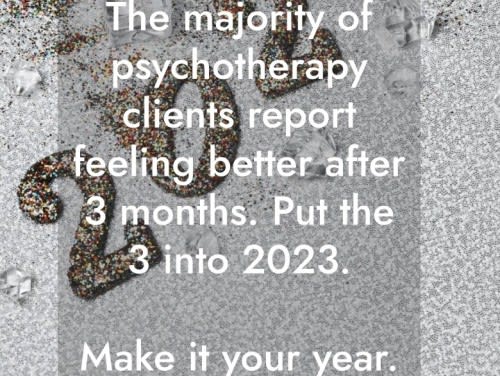How long does psychotherapy take to work?

posted 4th January 2023
When will I feel better after starting therapy?
The length of treatment for psychological problems will vary from one individual to another. Essentially, the treatment (type and duration) should always be matched appropriately to the nature and severity of the person's presenting difficulties.
What factors affect recovery times:
- How severe your symptoms are
- The type of mental illness you have or the specific situation you are facing
- How quickly you make progress, including your willingness to follow your therapist’s recommendations
- How long you’ve had symptoms or been dealing with the complication since treatment that is sooner often results in better outcomes sooner
- How much stress you are under right now
- How much support you have in overcoming and applying your therapy
In addition, you may face limitations in treatment depending on how often your insurance company allows you to visit for care.
Most people who obtain psychotherapy begin to see results right away. You may start to feel better after your first therapy session. It can take a long time to see improvements that significantly improve your long-term health. You will see improvements in the long run if you stick with the therapy even if at times you experience no change. Lots of factors impact how long it will take you to see results, it’s important to persevere with the therapy. Many people see improvement within a few weeks whilst others may need treatment for months to see significant improvement in symptoms.
So how long does it typically take for treatment to work?
- Recent research indicates that on average 15 to 20 sessions are required for 50 percent of patients to recover as indicated by self-reported symptom measures.
- There are a growing number of specific psychological treatments of moderate duration (e.g., 12 to 16 weekly sessions) that have been scientifically shown to result in clinically significant improvements.
- In practice, patients and therapists sometimes prefer to continue treatment over longer periods (e.g., 20 to 30 sessions over six months), to achieve more complete symptom remission and to feel confident in the skills needed to maintain treatment gains.
How long does it take for Cognitive Behavioural Therapy to work?
(CBT) focuses on how our thoughts, beliefs, and attitudes can affect our feelings and behavior. Traditional CBT treatment usually requires weekly 30- to 60-minute sessions over 12 to 20 weeks. A faster option now emerging is intensive which employs much longer sessions concentrated into a month, week, or weekend — or sometimes a single eight-hour session. Once learned, the coping strategies taught during CBT sessions can help people deal with a variety of problems throughout life.
Source: APA Div. 12 (Society of Clinical Psychology)



